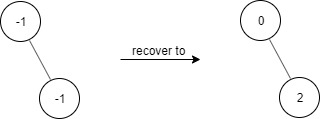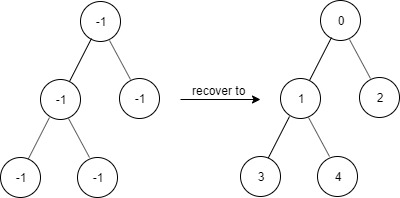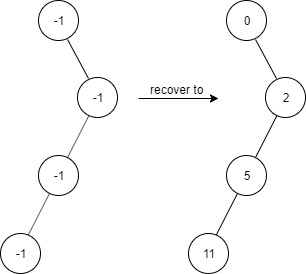题目如下:
Given a binary tree with the following rules:
root.val == 0- If
treeNode.val == xandtreeNode.left != null, thentreeNode.left.val == 2 * x + 1- If
treeNode.val == xandtreeNode.right != null, thentreeNode.right.val == 2 * x + 2Now the binary tree is contaminated, which means all
treeNode.valhave been changed to-1.You need to first recover the binary tree and then implement the
FindElementsclass:
FindElements(TreeNode* root)Initializes the object with a contamined binary tree, you need to recover it first.bool find(int target)Return if thetargetvalue exists in the recovered binary tree.Example 1:
Input ["FindElements","find","find"] [[[-1,null,-1]],[1],[2]] Output [null,false,true] Explanation FindElements findElements = new FindElements([-1,null,-1]); findElements.find(1); // return False findElements.find(2); // return TrueExample 2:
Input ["FindElements","find","find","find"] [[[-1,-1,-1,-1,-1]],[1],[3],[5]] Output [null,true,true,false] Explanation FindElements findElements = new FindElements([-1,-1,-1,-1,-1]); findElements.find(1); // return True findElements.find(3); // return True findElements.find(5); // return FalseExample 3:
Input ["FindElements","find","find","find","find"] [[[-1,null,-1,-1,null,-1]],[2],[3],[4],[5]] Output [null,true,false,false,true] Explanation FindElements findElements = new FindElements([-1,null,-1,-1,null,-1]); findElements.find(2); // return True findElements.find(3); // return False findElements.find(4); // return False findElements.find(5); // return TrueConstraints:
TreeNode.val == -1- The height of the binary tree is less than or equal to
20- The total number of nodes is between
[1, 10^4]- Total calls of
find()is between[1, 10^4]0 <= target <= 10^6
解题思路:题目很简单,先把树恢复,然后判断值是否存在。
代码如下:
# Definition for a binary tree node. # class TreeNode(object): # def __init__(self, x): # self.val = x # self.left = None # self.right = None class FindElements(object): dic = {} root = None def __init__(self, root): """ :type root: TreeNode """ self.dic = {} self.root = root def recursive(node,node_val): node.val = node_val self.dic[node.val] = 1 if node.left != None: recursive(node.left,node.val*2+1) if node.right != None: recursive(node.right,node.val*2+2) recursive(self.root,0) def find(self, target): """ :type target: int :rtype: bool """ return target in self.dic # Your FindElements object will be instantiated and called as such: # obj = FindElements(root) # param_1 = obj.find(target)


